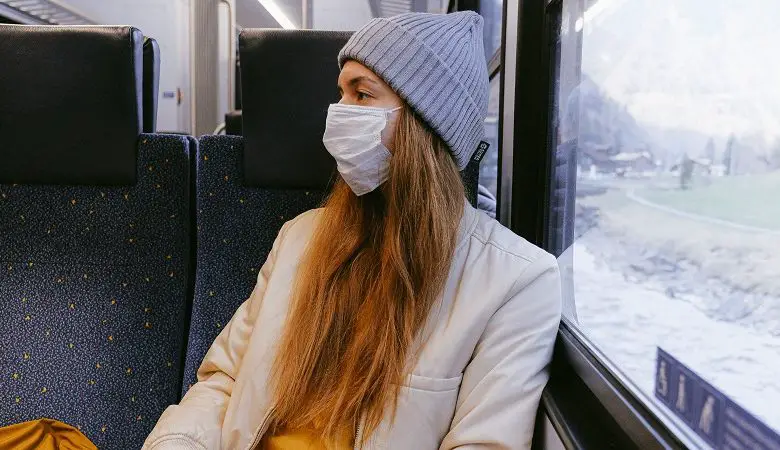
Face mask exemptions: how to ensure you don’t get fined if you’re exempt
This is an updated post from our archives. It highlights the historical importance of face mask exemptions during the Covid-19 pandemic and sheds light on the challenges disabled people faced to ensure their rights were respected.
The Historical Importance of Face Mask Exemptions
During the Covid-19 pandemic, many disabled people faced challenges navigating a world that increasingly relied on rigid public health rules. The introduction of face mask exemptions was a critical step in ensuring accessibility for those with hidden disabilities, respiratory conditions, or other health concerns.
To avoid fines or discrimination, it was essential to understand your rights and carry documentation where necessary. Organizations such as Gov.uk provided resources and guidance to help disabled people manage these regulations.
Today, it’s crucial to remember the importance of such measures and their ongoing relevance in creating an inclusive society. If you’re interested in learning more about your rights or tools that support accessibility, visit the UK Government’s website for updated guidance.
- Ensure your voice is heard in policy discussions.
- Advocate for better understanding of hidden disabilities.
- Support organizations promoting accessibility.
Original Article follows:
In 2020 and this year, face mask guidelines in the UK shifted frequently. England eased its rules earlier, but Scotland, Wales, and Northern Ireland mostly kept theirs. Now, England brings back face masks in lots of indoor places, like shops, shopping centres, and on public transport.
But what if that is difficult for you to do because of a disability or health condition? We explain the new rules around face masks, who is exempt from wearing one and how our face mask exemption card helps to ensure you don’t get fined.
LAST UPDATE: 13/12/2021
- Face masks: the different types
- Face coverings – what’s the difference?
- Face mask rules
- Face mask exemptions
- Face mask exemption card
Since June 2020, the UK has seen a number of changes to the rules around when and where face masks must be worn.
After the vaccination programme proved successful, all lockdown restrictions, including wearing a face mask in many settings, were eased in England in July 2021.
However, from Tuesday 30th November 2021, some restrictions were reimposed due to a new variant, Omicron, first discovered in South Africa.
Because it is unclear how transmissible the new variant is or how effective the vaccines are against it, people across the UK will have to wear face masks in many public places, including shops, public transport, theatres and cinemas.
Scotland, Wales and Northern Ireland have largely continued to make face masks mandatory but England is the only UK region to reinstate the rule.
As well as face masks, businesses, such as theatres and nightclubs, will have to use the NHS Covid Pass as a way of letting guests show proof of a vaccine or a negative test.
Also, from today, Monday 13th December 2021, workers are advised to work from home if they are able to.
In addition, anyone returning from an international country will have to take a PCR test before and after their returns, whether they’re fully vaccinated or not.
Although face masks are compulsory again, in certain circumstances, disabled people and those with health conditions will continue to be exempt from wearing a face mask.
Read on for more information, and head to the Disability Horizons Shop to buy our face mask exemption card to help stop you from being refused travel or entry.
You can also buy our social distancing lanyard and card or colourful sash to help you stay safe.
Face masks: the different types
There are a few different types of face masks or coverings:
- Surgical/medical masks – these disposable masks are usually made from three layers of material. They help to stop large droplets infected with Covid-19 from spreading, for example, if they are coughed or sneezed out by the wearer. They also help to stop droplets from others getting to the wearer’s mouth and nose.
- Filter face masks – these offer additional protection by filtering out smaller droplets for both the wearer and others (depending on the type of filter).
- Face shield and visor – plastic shields and visors either cover the entire face or top of it, stopping large droplets from reaching the wearer. They can be worn with other types of masks for added protection.
- General or fabric face coverings – made from a range of different fabrics, these also stop the spread of large droplets, protecting others from Covid-19 if the wearer has it – more on this below. These are the type the public is being told to wear.
You can find out more about these types of coverings in our article on filter vs medical vs fabric face masks.
You can buy disposable face masks on the Disability Horizons Shop, along with other Covid essentials, including plastic gloves and extra-thick aprons.
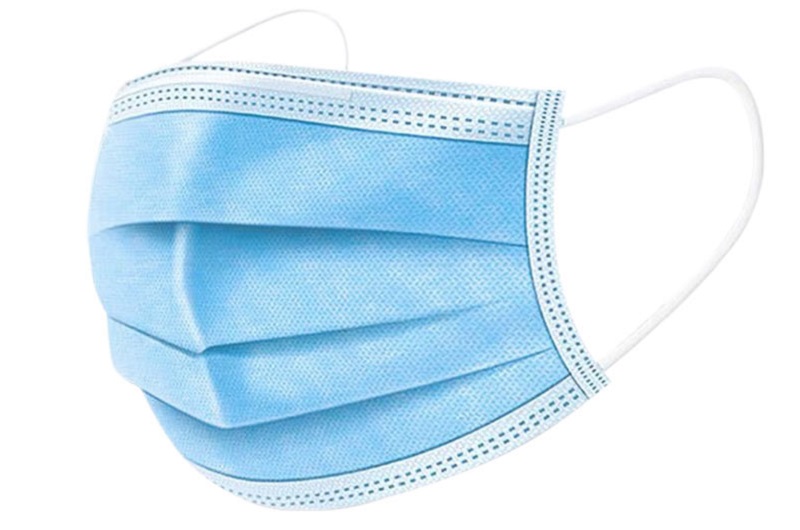
Face masks rules
Last year, the rules on when you must wear a face mask changed repeatedly. They have also been at odds depending on where in the UK you live – England, Scotland, Northern Ireland or Wales.
On 27th November 2021, the Government announced that face masks were mandatory again in some public places across the UK following the new Omicron variant. On the 10th December, the list of places was expanded.
Broadly speaking, throughout the UK, face masks have to be worn by customers and staff in many public indoor places (aside from hospitality), particularly if they are crowded and enclosed, and where you may come into contact with people you do not normally meet.
More specifically, face masks must be worn in the following places, with examples for each area:
- shops and supermarkets – places that offer goods or services for retail sale or hire. This includes shops within other premises, such as visitor attractions, for examples gift shops or museums.
- shopping centres – malls and indoor markets – and retail galleries
- places providing legal or financial services – post offices, banks, building societies, high-street solicitors and accountants, credit unions, short-term loan providers, savings clubs and money service businesses
- places offering personal care and beauty treatments – hair salons, barbers, nail salons, massage centres, tattoo and piercing parlours
- visitor attractions and entertainment venues, such as museums, galleries, cinemas, indoor theatres, concert halls, cultural and heritage sites, indoor areas at aquariums, zoos and visitor farms, bingo halls, amusement arcades, adventure activity centres, indoor sports stadiums, funfairs, indoor theme parks, casinos, skating rinks, bowling alleys and indoor play areas (including soft-play areas)
- public transport (aeroplanes, trains, trams, buses, coaches and ferries), taxis and private hire vehicles
- transport hubs – airports, rail and tram stations and terminals, maritime ports and terminals, bus and coach stations and terminals
- takeaways places without space for the consumption of food or drink on the premises
- any car or small van during a professionally delivered driving lesson, a practical driving test, or during one of the practical tests for giving driving instruction, and in all HGV lessons and tests
- driving test theory centres
- community centres (including village halls), youth centres, member and social clubs
- polling stations and premises used for the counting of votes
- indoor areas of open-air sports stadiums
- public areas in hotels and hostels
- crematoria and burial ground chapels
- libraries and public reading rooms
- estate and letting agents
- motorway service areas
- retail travel agents
- public-facing funeral offices
- places of worship
- veterinary services
- pharmacies
- auction houses
You also need to wear a face covering in NHS settings, including hospitals and primary or community care settings, such as GP surgeries.
Face coverings are not legally required in hospitality settings, or in exercise facilities including gyms, dance studios, swimming pools or leisure centres.
The list above is from the Government website for England, but they largely apply elsewhere too.
However, do keep in mind that there are differences in examples used by different Governments. For instance, some of the places listed above aren’t explicitly mentioned elsewhere, so please do check the Government website for where you live:
- Face masks rules in England
- Face masks rules in Scotland
- Face masks rules in Northern Ireland
- Face masks rules in Wales
If you’re unsure whether a rule applies or not, we’d recommend wearing a face covering anyway if you are able to.
Enforcing face masks in the UK
In England and Northern Ireland, if you’re caught without a face mask, you’ll be denied access to the premises and fined £200 – up from £100. This can be reduced to £100 if it is paid within 14 days.
If you are a repeat offender, the fines will double each time – for example, £400 on the second occurrence and £800 on the third – and there won’t be a discount. Fines can be issued up to a maximum of £6,400.
In Scotland and Wales, a £60 fine can be imposed (halving to £30 if paid within 28 days). Repeat offenders face bigger fines.
As an employee in other work contexts, it’s up to individual businesses to assess whether PPE is necessary for any particular context, not listed above, so check the rules for your particular work setting with your employer.
Face masks rules in schools
As of the 17th May 2021, secondary school pupils in England no longer had to wear face coverings in classes. However, due to the new Omicron variant, face masks will be compulsory for all secondary pupils and staff in communal areas.
In Scotland, staff and pupils in high schools should wear face coverings in classrooms, communal areas and corridors.
Secondary schools in Wales stopped making face mask compulsory in mid-November but may change their guidelines following the Omicron variant in the next few days.
Face coverings must be worn in post-primary schools and on public and school transport in Northern Ireland.
If you’re concerned about wearing a face mask and don’t think you’re exempt, try these face mask bracket inserts (pictured below) to help make breathing in a mask easier.
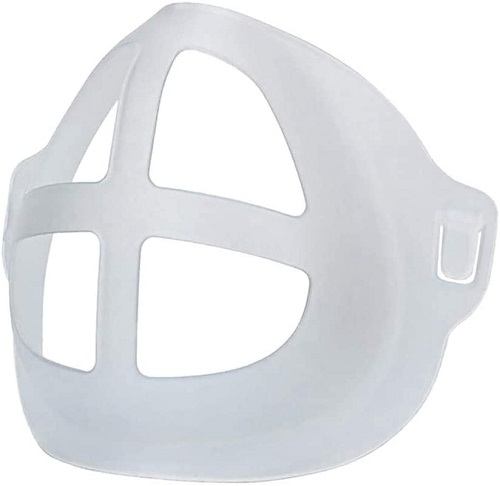
Face mask exemptions
In England and Wales, these rules don’t apply to children under the age of 11 – under 5 in Scotland and 13 in Northern Ireland – and across the UK some disabled people or those with health conditions where there is a legitimate or reasonable reason not to, as listed under Government guidelines. This includes:
- if you cannot put on, wear or remove a face covering because of a physical or mental illness or impairment, or disability
- if putting on, wearing or removing a face covering will cause you severe distress
- if you are speaking to or providing assistance to someone who relies on lip-reading, clear sound or facial expressions to communicate (take a look at our lip-reading exemption card).
To put this into context, exemptions can apply if you have a disability or condition that would make it very difficult to wear a face covering.
For example, if you have a respiratory condition, such as chronic obstructive pulmonary disease, emphysema or bronchitis, you may find it too difficult to breathe through a face covering.
If you have a learning difficulty, sensory processing disorder or neurodivergent condition, wearing a mask could be too overwhelming.
If you have communication difficulties, speech impairment or find it hard to express yourself with a mask on, especially if you are non-verbal, a mask would be difficult.
This could also be the case if you have a mental health condition or invisible disability, such as dementia, post-traumatic stress disorder, severe anxiety or have experienced violence or abuse.
This list is not exhaustive and there will be many other disabilities that would make wearing a mask very difficult.
If you need to lip-read, you might want to try a lip-reading face mask for you and your companion, and our ‘I need to lip-read card’ card.
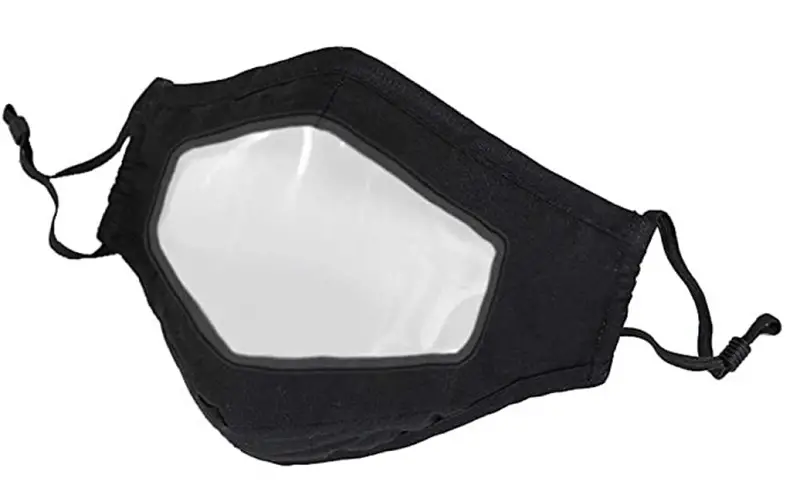
Other exemptions apply to some employees in indoor settings, such as transport workers, police and emergency workers, and some specific situations, such as if you’re exercising and wearing one would impact your ability to participate.
You can also remove your mask for a short time in certain circumstances, such as:
- if you need to avoid a threat, harm or injury
- if you are asked to do so for identification, for example in a bank or pharmacy
- to receive treatment or services, such as when getting a medical procedure
- because you need to eat, say because you’re diabetic
- to take medication.
Visit the Government website for the full list of reasons. These exemptions are similar in Scotland, Northern Ireland and Wales, although please do check for details where you live.
Face mask exemption card
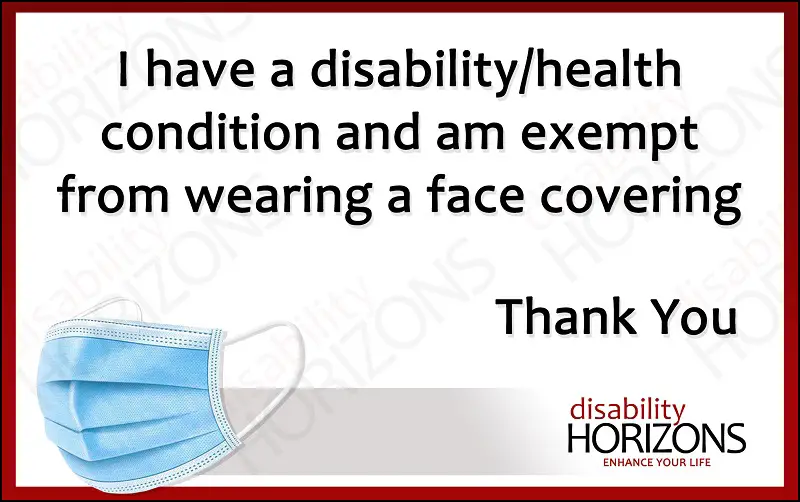 If you have a disability or condition that falls into one of the categories listed above, you can self-certify as being exempt – you don’t have to provide proof.
If you have a disability or condition that falls into one of the categories listed above, you can self-certify as being exempt – you don’t have to provide proof.
To help ensure you feel more comfortable, we’ve created an exemption card for those who have a genuine reason to not wear a mask.
Our mask exemption card comes on a lanyard or badge clip. It is a durable, portable pass that you can wear around your neck or pinned to your coat or top while travelling or shopping.
It provides staff and others around you with immediate and simple-to-understand information regarding your mask exemption.
The bright red lanyard has ‘MASK EXEMPT’ written in white capital letters so it is easy to see. The credit card-sized ID badge further explains your mask exemption as being due to a “disability/health condition”. Both can be seen and read at a safe distance.
There isn’t a legal requirement to wear a lanyard or display any form of exemption, but our card will give you an easy and quick way to convey your medical exemption.
There is also the option to purchase the ID card with a badge clip instead of a lanyard, which can be worn on shirts, tops or coats.
The pocked-sized design of the ID, badge clip and lanyard means it can be stored in your coat or bag making it easy to access and put around your neck or pin to you.
The badge costs just £2.95, the lanyard £3.95 and for it is £4.95 for both.
Head to the Disability Horizons Shop now to buy your face mask exemption card on a lanyard or as a badge to make sure you’re covered when you travel and shop.
Please note, these cards are ONLY designed for people with a genuine reason for not wearing a mask. If you do not have a legitimate reason listed under Government guidelines, you’re open to being fined.
By Disability Horizons
More on Disability Horizons…
- Buy Covid essentials from the Disability Horizons Shop
- Coronavirus: how to keep safe if you use carers and PAs
- Coronavirus shopping safely: how to get your food if you’re disabled
- Buy the Covid-19 Pass exemption card on the Disability Horizons Shop
Originally posted on 22/06/2020 @ 11:10 am
The naysayers are already attacking cards like this. There are LEGITIMATE reasons why wearing a facemask is harmful to health. For example as an asthma sufferer myself, I find it much harder to breathe in a facemask, breathing is significantly labored in a mask. Also, claustrophobia makes you feel as if you are in an enclosed space wearing a mask. Not to mention, your vision is harmed in a mask when moist air escapes out of the top and fogs glasses, making it impossible to use corrective lenses. The “normal” people don’t believe these conditions are real, because they don’t have to deal with them.
I have a great difficulties to wear one, Oxygen level goes below 90% , (COPD) I start coughing and do not see anything through fogged glasses . Mask are here as mind control tool, It also make us sick
Hi I often suffer with sinus problems and i can only breathe through my mouth sometimes. covering my mouth when I have this makes me panic. Are these exemption cards totally legal because im worried what would happen if im challenged.
Hi
Thank you for your comment. You are only exempt if you have a legitimate reason as listed above and on the Government website. If you’re health condition falls into one of those categories, you can self-certify as exempt.
We hope that helps.
What happens when a shop refuses entry though. Given the nature of the law it is clearly discriminatory for the shop to do this. And for some people this is an additional stressor. I should think there are a number of people for whom suicide – to just curl up and die is becoming an evermore viable solution to their daily struggles.
do these cards have your name on it as i have had two
Hi Leslie
Thank you for your comment. No, the cards are generic and don’t have names on them.
I can’t wear a face cover of any description as I am autistic with severe sensory issues. I can’t have anything touching my face or head. I wear a badge and have a sunflower lanyard pinned to my badge, but I’ve still had people shouting at me. Please be kind, as not all disabilities are visible.